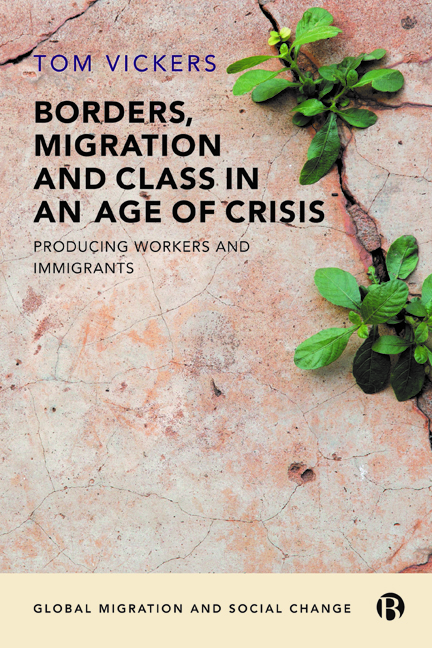Book contents
- Frontmatter
- Dedication
- Global Migration and Social Change
- Contents
- List of Figures and Tables
- Acknowledgements
- Series Preface
- 1 Introduction
- 2 Imperialism, Migration and Class in the 21st Century
- 3 Deconstructing Migrant Crises in Europe
- 4 Deconstructing Welfare Crises
- 5 Mobility Power and Labour Power in the Crisis of Imperialism
- 6 Deconstructing Migrant/Worker Categories in Britain
- 7 Conclusion
- Appendix: Methodology
- References
- Index
4 - Deconstructing Welfare Crises
Published online by Cambridge University Press: 30 April 2022
- Frontmatter
- Dedication
- Global Migration and Social Change
- Contents
- List of Figures and Tables
- Acknowledgements
- Series Preface
- 1 Introduction
- 2 Imperialism, Migration and Class in the 21st Century
- 3 Deconstructing Migrant Crises in Europe
- 4 Deconstructing Welfare Crises
- 5 Mobility Power and Labour Power in the Crisis of Imperialism
- 6 Deconstructing Migrant/Worker Categories in Britain
- 7 Conclusion
- Appendix: Methodology
- References
- Index
Summary
Introduction: state welfare and the crisis of imperialism
This chapter further develops an analysis of the British state, focusing on state welfare. It argues that increasing conditionality has combined with long-standing forms of differential inclusion to tighten labour discipline and create conditions for more intense exploitation. This builds on the introductory discussion in Chapter 2 and the examination of the state’s role in regulating international migration in Chapter 3. The chapter begins by connecting the crises of state welfare in Britain to the capitalist crisis. Changes to the character of welfare are considered, with attention to the growth of outsourcing and the presentation of austerity as an economic necessity. This is followed by an examination of policy and practice relating to three welfare domains that have been presented as sites of crisis in recent years: the National Health Service (NHS) and social care; housing; and the benefits system. The last part of the chapter explores counter-narratives within social movements and campaigns for the insights that they provide about alternative understandings of the nature and causes of welfare crises and their relation to migration and borders.
British state welfare: roots of the crisis
Expansions and contractions of capitalist state welfare have operated largely on a national basis. Welfare provision in each country is shaped by its relationships to global capital, mediated by economic conditions, the strength and politics of working-class organisation, and the example of rival systems.
State welfare is socially useful but does not produce value in a capitalist sense; it therefore represents a deduction from surplus value produced elsewhere (Yaffe, 1972). In this sense, state welfare is a concession to the working class, whereby a portion of the wealth produced by workers and seized by the ruling classes as surplus value is ‘given back’ in the form of services or benefits, making workers less dependent on wages. This helps to explain the determination with which capitalist governments have sought to restrict welfare spending, intensifying in periods of capitalist crisis. Capitalist state welfare plays other roles as well. It subsidises employers by allowing them to pay poverty-level wages while state welfare makes up the difference to enable the reproduction of labour power.
- Type
- Chapter
- Information
- Borders, Migration and Class in an Age of CrisisProducing Workers and Immigrants, pp. 95 - 132Publisher: Bristol University PressPrint publication year: 2019



